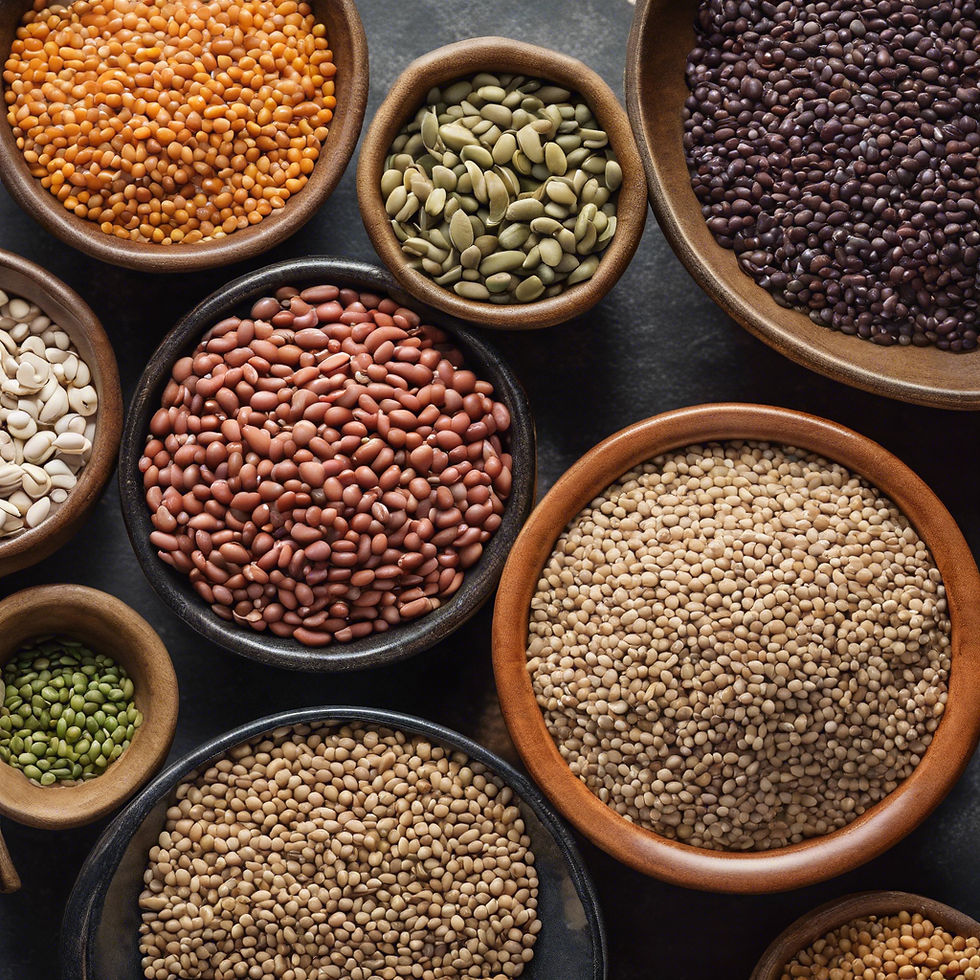Grain-Free or Grain-Inclusive? Choosing the Right Diet for Your Dog
- amc7181
- Jul 20, 2025
- 3 min read
The debate over grain-free versus grain-inclusive diets for dogs has been a hot topic in recent years. While some dogs thrive on grain-free diets, others have faced health issues linked to improperly formulated grain-free foods. At Curly Tail Nutrition, we believe that grains can have a place in your dog’s diet when used thoughtfully—but they are not essential for many dogs. Let’s explore the facts about grain-free diets, the controversy surrounding diet-associated dilated cardiomyopathy (DCM), and how to make the best choice for your dog.
What Is Dilated Cardiomyopathy (DCM)?
DCM is a serious heart condition where the heart becomes enlarged and weakened, reducing its ability to pump blood effectively. Symptoms in dogs include lethargy, coughing, difficulty breathing, and, in severe cases, sudden collapse or death.
The grain-free diet controversy began in 2018 when the FDA started investigating a potential link between grain-free diets and an increase in DCM cases. Most affected dogs were eating boutique, exotic, or grain-free (BEG) diets. The issue wasn’t the lack of grains themselves but rather the use of improper ingredients and nutritional imbalances in some grain-free foods.
What Caused the DCM Cases?

The rise in DCM cases was linked to:
Improper Ingredients: Many grain-free diets replaced grains with legumes (peas, lentils, chickpeas) or potatoes, which were used in high amounts. While these ingredients aren’t inherently harmful, they can interfere with taurine metabolism. Taurine is an amino acid critical for heart health, and deficiencies in taurine are associated with DCM.
Ingredient Imbalances: In some cases, diets relied on legumes or potatoes not only as carbohydrate sources but also as protein sources. This led to a lack of high-quality animal-based protein, which is essential for proper taurine levels.
Boutique Diets: Some smaller pet food brands lacked the expertise or resources to ensure their recipes met all nutritional requirements, contributing to imbalanced formulations.
As Dr. Lisa Freeman, a veterinary nutritionist, explains: "The issue is not grains versus grain-free, but rather the formulation of the diet. Using excessive amounts of certain ingredients without understanding their impact on overall nutrition can lead to serious health problems."
Are Grains Necessary in a Dog’s Diet?
Dogs are omnivores and can thrive on diets with or without grains, as long as the diet is complete and balanced. Grains are not a required nutrient for dogs, but they can offer benefits when used appropriately:
Energy Source: Grains like rice, oats, and barley provide easily digestible carbohydrates that are great for dogs needing quick energy bursts, such as working or sporting dogs.
Fiber: Whole grains contribute to healthy digestion by providing dietary fiber.
Vitamins and Minerals: Grains can add nutrients like B vitamins, magnesium, and selenium.
However, grains should never be used as a primary protein source in a dog’s diet. Protein should come from high-quality animal sources to ensure proper levels of essential amino acids like taurine.
Dr. Darcy Adin, a veterinary cardiologist, adds:"While grain-free diets may not be the sole cause of DCM, it is clear that the nutritional profile of the food plays a critical role in heart health. Ensuring that all essential nutrients are present in the correct amounts is vital."
Appropriate vs. Inappropriate Grains

When choosing grains for your dog’s diet, it’s important to pick the right ones:
Appropriate Grains:
Brown rice: Easily digestible and nutrient-rich.
Oats: A good source of soluble fiber and vitamins.
Barley: Provides energy and fiber.
Quinoa: Technically a seed, but often classified as a grain, it’s a great gluten-free option with high nutrient density.
Inappropriate Grains:
Corn: While not harmful, it’s often overused as a filler and provides minimal nutritional value.
Wheat: Can be problematic for dogs with sensitivities or allergies.
Sorghum and millet: Sometimes used in large amounts in lower-quality foods as cheap fillers.
Curly Tail Nutrition’s Approach to Grains
At Curly Tail Nutrition, we don’t take a one-size-fits-all approach. Whether or not to include grains in your dog’s diet depends on:
Your Dog’s Needs: Active dogs may benefit from the quick energy grains provide, while dogs with allergies or sensitivities may do better on a grain-free diet.
Your Preferences: We respect pet parents’ choices and work with you to create a diet you’re comfortable with.
Balanced Formulation: When we use grains, we ensure they are appropriately incorporated as a source of energy, not protein, and that the diet is complete and balanced to support your dog’s health.
The Bottom Line
Grains are not inherently good or bad for dogs. What matters most is the quality and balance of the overall diet. Whether your dog thrives on a grain-free or grain-inclusive diet, it’s crucial to focus on high-quality ingredients and proper formulation to avoid nutritional deficiencies or imbalances.
If you’re unsure whether grains belong in your dog’s bowl, Curly Tail Nutrition is here to help. Contact us today to create a custom diet that meets your dog’s unique needs—grain-free, grain-inclusive, or somewhere in between. Because every tail deserves the best nutrition!







Comments